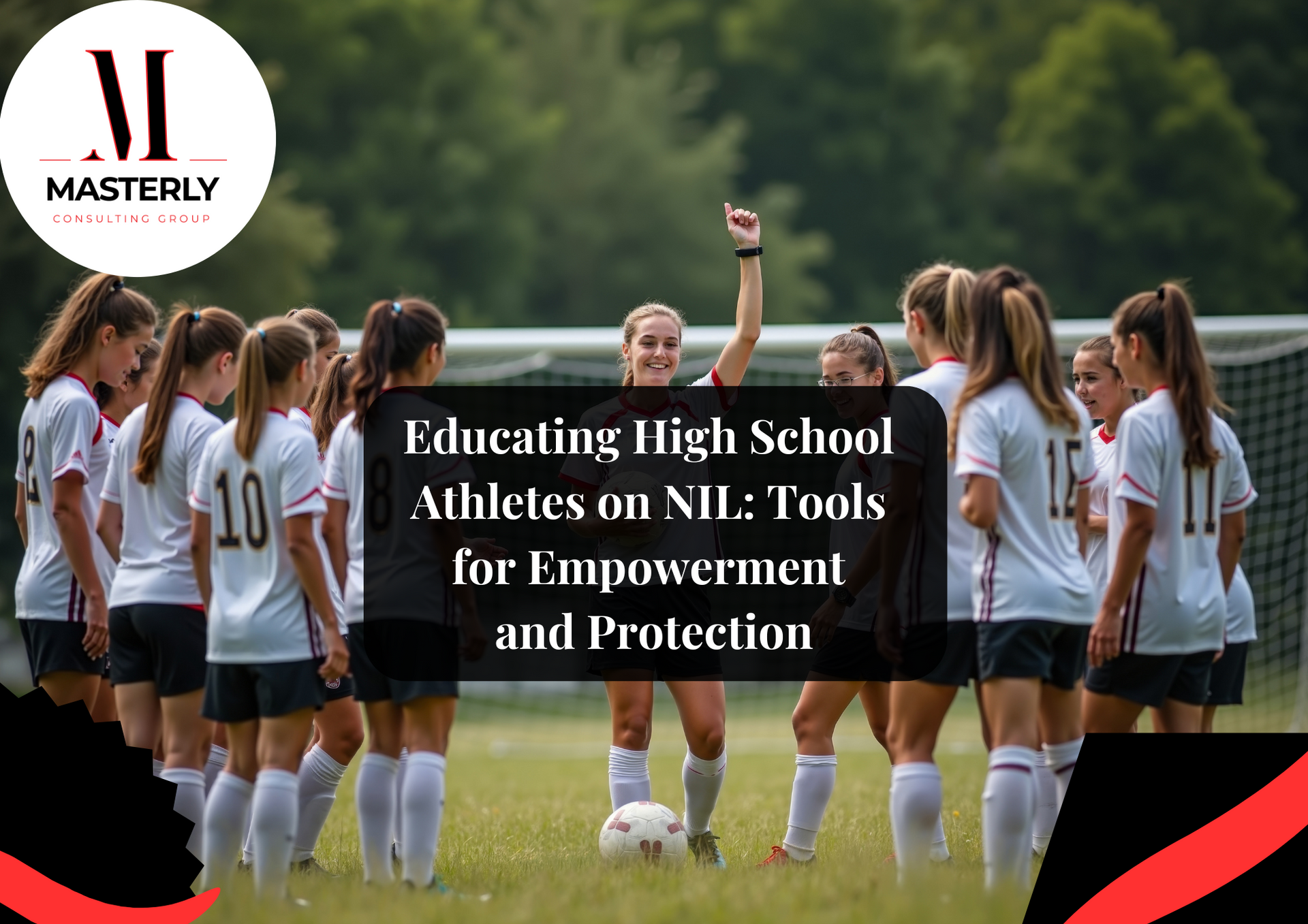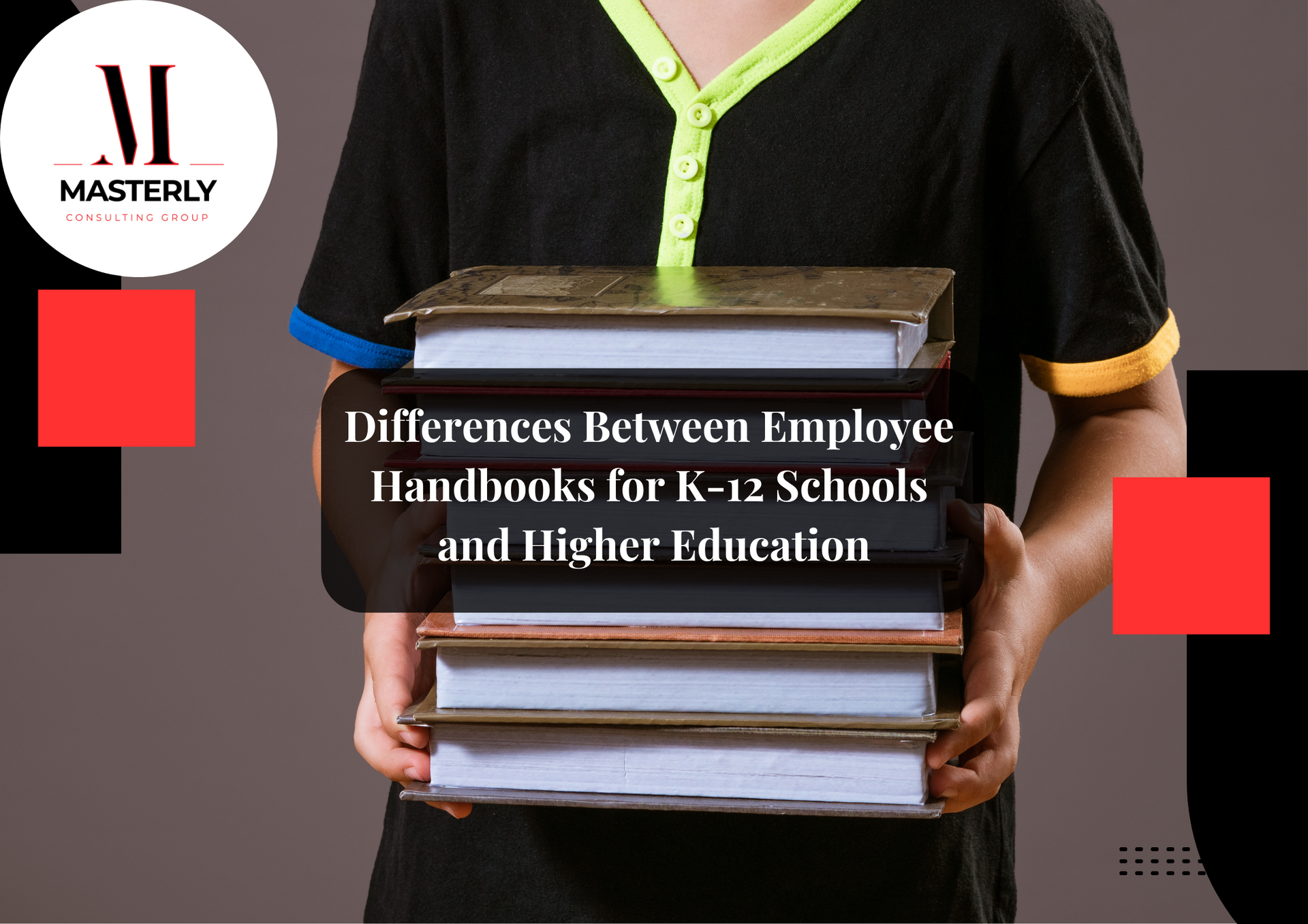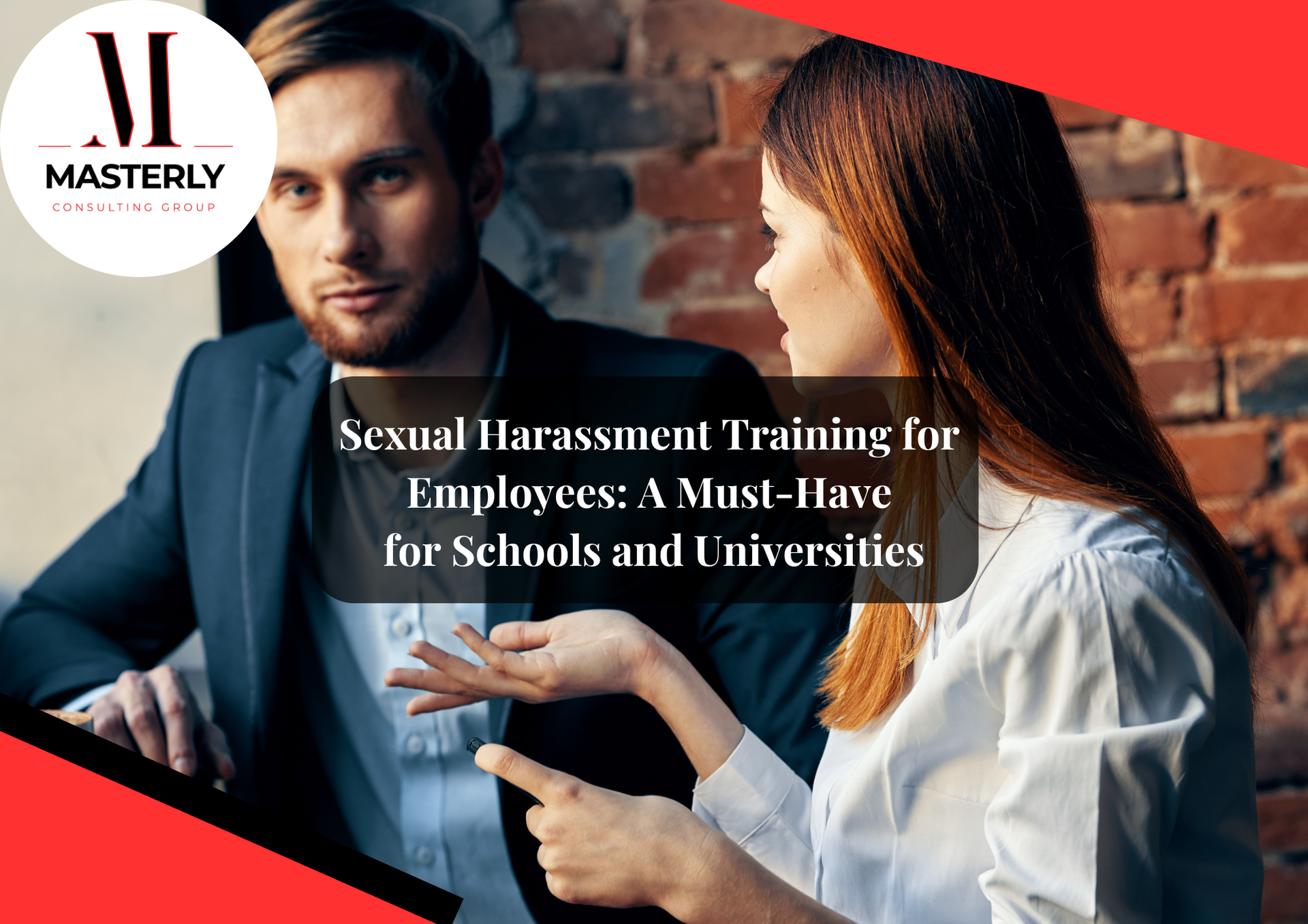Why Every School Needs a Legally Compliant Employee Handbook
Educational institutions face unique challenges when managing their staff, from adhering to specific state and federal laws to creating a positive work environment that fosters employee engagement and productivity. One of the most important tools in this process is a legally compliant employee handbook. A well-structured employee handbook serves as a comprehensive guide for school staff, detailing expectations, policies, and procedures that align with legal requirements and the school's mission. This article will explore why every school needs a legally compliant employee handbook, how it can reduce risk, and how The Masterly Consulting Group can help educational institutions create tailored handbooks that protect their interests and foster a positive workplace culture.
The Importance of a Legally Compliant Employee Handbook
Ensuring Compliance with Laws and Regulations
Schools operate under various state and federal regulations, such as anti-discrimination policies, employment laws, and workplace safety guidelines. Having a legally compliant employee handbook is essential to meet these requirements and avoid legal liabilities. An up-to-date handbook ensures that all employment policies align with the latest federal and state laws, reducing the risk of lawsuits or penalties.
- Anti-discrimination policies: These policies must be clear and reflect the school’s commitment to an inclusive workplace.
- Applicable laws: The handbook should outline how the school adheres to labor laws, such as the Fair Labor Standards Act (FLSA) and the Family and Medical Leave Act (FMLA).
Protecting the School from Legal Liability
A school without a legally compliant employee handbook exposes itself to significant legal risks. For example, disputes over disciplinary actions, employee behavior, or workplace policies can lead to lawsuits if there is no clear documentation outlining procedures. A well-drafted handbook protects the school by establishing a consistent message and code of conduct for employees to follow.
- Code of conduct: Outlines acceptable and unacceptable behavior, reducing confusion about what the school expects.
- Disciplinary actions: Provides a clear process for handling employee behavior that violates the school’s policies.
Clarity and Transparency for Employees
One of the most important functions of an employee handbook is to inform employees about their rights, responsibilities, and the school’s expectations. A legally compliant employee handbook provides new hires and existing employees with a clear understanding of workplace policies and procedures. It helps create transparency, ensuring that everyone is on the same page when it comes to performance expectations, dress code, paid time off, and sick leave.
- Dress code: Provides guidelines on professional attire for faculty and staff.
- Employee benefits: Outlines the benefits available to employees, such as health insurance, paid time off, and parental leave.
- Workplace policies: Includes policies like anti-harassment and anti-discrimination to create a safe and inclusive environment.

Why Customization is Key for Educational Institutions
Tailoring to the School’s Mission and Culture
Every school has a unique mission and organizational culture, and a one-size-fits-all employee handbook will not reflect these nuances. Customizing the handbook to align with the school's values and company culture is essential. This customization ensures that the policies not only comply with legal standards but also promote the school's mission, fostering an environment where staff can thrive.
- Company’s mission: Reflects the educational goals and values of the institution.
- Company culture: Promotes a positive work environment, encouraging collaboration and professional development among staff.
Addressing the Needs of Different Employee Groups
Educational institutions often employ a diverse workforce, including teachers, administrators, part-time employees, and support staff. A comprehensive employee handbook must cater to the varying needs of these groups by addressing specific policies relevant to their roles. For example, policies for full-time educators may differ from those for part-time employees or administrative staff.
- Part-time employees: Outline their specific rights, benefits, and responsibilities.
- Teachers and administrators: Custom policies that reflect their unique roles and expectations within the school.
Establishing Clear Expectations for Employee Behavior
A clear and well-communicated employee handbook establishes what the school expects from its staff in terms of behavior, performance, and professionalism. This not only helps employees understand their roles better but also reduces conflicts and misunderstandings. By defining company policies and the company’s code of conduct, schools can foster a more cohesive and productive work environment.
- Clear expectations: Ensure that all employees understand what is expected of them in terms of performance and behavior.
- Employee engagement: A clear handbook helps increase employee engagement by providing transparency and support for staff members.
How a Legally Compliant Employee Handbook Reduces Risk
Mitigating Legal Risks for Schools
By creating a legally compliant employee handbook, schools can significantly reduce the risk of employment disputes. A well-written handbook serves as a reference point for resolving conflicts related to employment policies, ensuring that both the employer and employee are aware of their rights and obligations.
- Legal liability: A legally compliant handbook minimizes the risk of lawsuits and ensures that the school follows employment laws.
- Consistent message: A consistent handbook creates uniformity in how employment policies are applied across the school.
Enhancing Employee Morale and Retention
An employee handbook that is clear, legally compliant, and aligned with the school’s values can enhance employee morale and retention. When employees feel that they are informed and supported by their employer, they are more likely to remain engaged and committed to their roles. This is particularly important in educational settings, where high turnover can disrupt the learning environment.
- Employee rights: Clearly outlines employee rights and protections, fostering a sense of security among staff.
- Performance reviews: Establishes fair and consistent processes for evaluating employee performance, further contributing to job satisfaction.
Keeping Your Employee Handbook Up to Date
Educational institutions must keep their employee handbooks up to date to reflect changes in laws, workplace policies, and organizational culture. Schools that fail to update their handbooks risk non-compliance with legal requirements, which could lead to costly penalties. Regular updates ensure that the handbook remains a relevant and effective tool for managing employees.
- Living document: A handbook should be treated as a living document that evolves with changes in laws and school policies.
- Up to date: Regular updates keep the handbook aligned with current legal and organizational standards.

How The Masterly Consulting Group Can Help
Expertise in Education Employment Law
The Masterly Consulting Group has extensive experience helping educational institutions create legally compliant employee handbooks. We understand the complexities of employment law and the unique challenges schools face. Our team works closely with school HR departments to develop handbooks that not only meet legal standards but also reflect the school’s mission, culture, and values.
- Business consulting: Our business consulting services focus on helping schools navigate the complexities of employment law and HR management.
- Legal compliance: We ensure that all handbooks are fully compliant with the latest federal and state laws, reducing the risk of legal liabilities.
Tailored Solutions for Your School
At The Masterly Consulting Group, we believe that every school is unique. That’s why we offer tailored employee handbook solutions that address the specific needs of your institution. Whether you’re looking to create a new handbook or update an existing one, our team is here to help.
- Customized policies: We create handbooks that are customized to your school’s specific requirements, ensuring legal compliance and alignment with your organizational culture.
- Reducing risk: Our handbooks are designed to minimize legal risks while fostering a positive and productive work environment.
Providing Comprehensive HR Support
In addition to helping schools create legally compliant employee handbooks, The Masterly Consulting Group offers a range of HR consulting services that can further enhance your school’s operations. From performance reviews to employee benefits and beyond, we provide guidance to ensure your school is running efficiently and effectively.
- Employment policies: Our team provides guidance on crafting employment policies that are both legally compliant and tailored to your school’s needs.
- Employee engagement: We help schools create handbooks that improve employee engagement and satisfaction.
Why Your School Needs a Comprehensive Employee Manual
An employee manual is a critical tool for schools to outline workplace policies and communicate expectations clearly to staff. This document helps schools establish consistent procedures across their organization, ensuring that all employees—from new hires to long-time staff members—understand what the company expects in terms of performance, behavior, and compliance. A comprehensive employee manual also provides clear guidance on issues such as the company’s values, the company mission, and how these align with the school's educational goals. By establishing these guidelines, schools can create a cohesive work environment that supports both the institution's culture and its educational objectives.

Incorporating Employee Handbook Examples into Your School’s Policies
Using employee handbook examples from other educational institutions or similar industries can provide valuable insights when creating your school's handbook. These examples can help your school easily create a handbook that aligns with its specific business operations and addresses the unique needs of its staff. By reviewing examples, schools can better tailor policies related to working hours, communications policy, and expectations for new employees, ensuring that the handbook fits the school's culture while maintaining legal compliance.
Aligning Your School’s Handbook with Company Values and Mission
A legally compliant employee handbook should reflect your school’s company values and company mission to ensure alignment with the educational goals and the broader vision of the institution. When the handbook communicates these core values clearly, it reinforces the school's commitment to its staff and students, helping to build a strong sense of community. This approach supports not just compliance but also fosters a positive organization’s culture where all employees understand how their roles contribute to the institution’s overall success.
The Importance of Legally Compliant Handbooks for Small Educational Businesses
Even small businesses in the educational sector, such as private schools or learning centers, need legally compliant employee handbooks to protect themselves from potential risks. For small educational institutions, the employee handbook serves as an essential tool to communicate policies, set expectations, and ensure all new employees are aware of the rules from day one. With clear policies on issues like appropriate use of resources, working hours, and waiting periods for benefits, small educational businesses can avoid confusion and ensure consistency across the board.
Setting the Foundation: How an Employee Manual Benefits Your School's Employees
A well-designed employee manual is crucial for ensuring that all of the company’s employees are aware of the school's policies, procedures, and expectations. This manual provides clarity on topics such as behavior, disciplinary actions, and roles within the organization, which helps create a smoother onboarding process for both new employees and existing staff. By incorporating guidelines that reflect the company’s culture, the manual ensures that all staff members operate under a unified set of standards, contributing to a more cohesive and professional work environment.
Building a Positive School Culture through a Legally Compliant Employee Handbook
A legally compliant employee handbook plays a significant role in defining and promoting the company's culture within an educational setting. By clearly outlining the values and behavioral expectations, the handbook not only helps maintain compliance with laws but also fosters a sense of community among employees. When schools align their policies with the institution’s mission and culture, they create an environment where both students and staff can thrive, ultimately benefiting the entire organization.
The Role of Legally Compliant Handbooks in Promoting Economic Development for Schools
Ensuring that your school has a legally compliant employee handbook isn’t just about following regulations—it’s also about supporting long-term economic development. By protecting the school from potential lawsuits and fostering a positive work environment, the handbook can lead to improved staff retention and productivity. These factors contribute to the financial stability and growth of educational institutions, which is especially important for maintaining competitiveness in today’s evolving educational industry.
Smooth Onboarding: Welcome Letters and Policies for New Employees
One of the first interactions a new employee has with your school is through the welcome letter and onboarding materials. A legally compliant employee handbook is an essential part of this onboarding process, as it provides new hires with a clear understanding of the school's policies, such as the waiting period for benefits or guidelines for professional conduct. By giving new employees a thorough introduction to the school’s culture and policies, the handbook ensures they start their journey on the right foot, reducing confusion and helping them integrate quickly.
Why Legally Compliant Handbooks Matter for Employers in the Education Industry
Educational employers face unique challenges that make a legally compliant employee handbook essential. Schools, like other companies, must ensure that their handbooks are up to date with labor laws, anti-harassment policies, and other critical regulations. A thorough handbook helps schools avoid legal pitfalls and ensures a consistent approach to managing staff. In today’s education industry, where legal requirements frequently evolve, having a compliant handbook helps employers stay ahead and maintain a healthy, efficient work environment.
Welcoming New Employees: The Role of an Employee Manual and Clear Policies
For any new employee, a well-crafted employee manual serves as an essential guide to understanding the school’s culture, expectations, and policies from day one. Along with a personalized welcome letter, this manual helps new hires transition smoothly into their roles by providing clear information about their responsibilities and workplace standards. Additionally, it outlines important aspects such as the waiting period for benefits, ensuring that the company’s employees have a comprehensive understanding of their rights and timelines from the start.
Why Schools, Like Other Companies, Need a Legally Compliant Employee Handbook
Educational institutions, like all other companies, are responsible for creating a legally compliant employee handbook to protect both the organization and its staff. For employers in the education sector, this handbook serves as a vital tool for managing employee relations, reducing legal risks, and maintaining consistency in the enforcement of policies. By implementing a compliant handbook, schools can avoid the challenges and legal pitfalls faced by many other companies that fail to address evolving labor laws and employee rights.
Setting the Tone: A Welcome Letter and Clear Policies for Every New Employee
When a new employee joins your school, their first impressions are critical. A welcome letter, paired with a legally compliant employee handbook, introduces them to the school's policies, culture, and expectations. This comprehensive approach ensures that new hires understand important details like the waiting period for benefits, their role within the organization, and the standards they are expected to meet. By providing clarity from the beginning, schools create a supportive environment that fosters long-term success for both staff and the institution.
Why Schools, Like Other Companies, Must Have a Legally Compliant Employee Handbook
Schools are just like other companies in needing a legally compliant employee handbook to protect themselves and their staff. For educational employers, having this handbook is crucial for outlining policies, ensuring compliance with labor laws, and managing staff expectations. Just as businesses in other sectors prioritize employee handbooks to minimize legal risks, schools must also implement clear, legally sound guidelines to avoid conflicts and maintain a positive workplace environment.
Get Expert Help with Your Employee Handbook
If your school needs help creating or updating a legally compliant employee handbook, The Masterly Consulting Group is here to assist. Our team of experts is dedicated to helping educational institutions navigate the complexities of employment law while promoting a positive and productive work environment.
Contact us at (888) 209-4055 to book a free consultation. We’re here to answer any questions you may have and provide customized solutions that meet the unique needs of your school.


Masterly Consulting Group
Office Number
(888) 209-4055
Office Locations
Dallas, TX | Uptown Area
Houston, TX | Galleria Area
Grand Prairie | Training Center
West Palm Beach, FL | Downtown
Coming Soon
Atlanta, GA
Latest news






